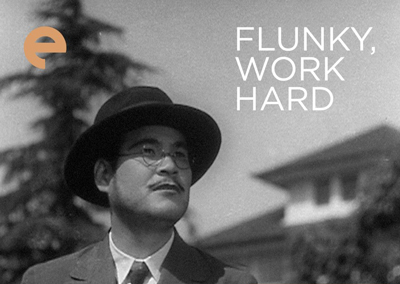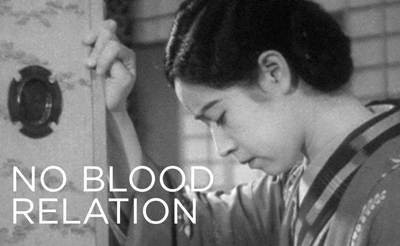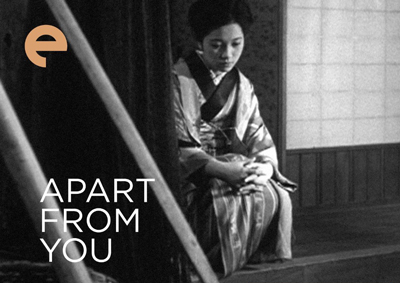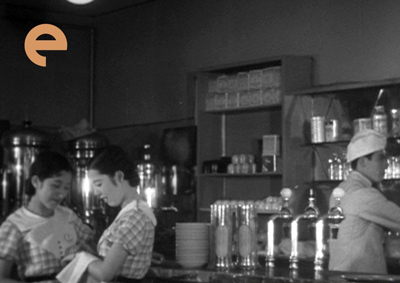
 |
|
|
|
Criterion has already released Japanese director Mikio Naruse's When a Woman Ascends the Stairs (1960), an emotionally compelling story of a Ginza businesswoman trying to maintain her independence. Now we get a sampling of the director's early silent work, filmed under unfavorable conditions at the Shochiku studio during an economic depression. From almost the beginning Naruse's main concern are the problems of working class women, who struggle with financial hardship but also against outmoded social codes. Japanese films didn't make the complete changeover to talkies until around 1935. Eclipse's Series 26 set Silent Naruse is said to gather what remains of Mikio Naruse's silent film career: out of 24 pictures, only five survive. 
From 1931, Flunky, Work Hard (Koshiben gambare) is almost an extended short subject. The focus is a family struggling to stay afloat in bad times. The father Okabe (Isamu Yamaguchi) finds selling insurance policies is very difficult and competitive, and his scrapes with a salesman from another firm are compared with the fights his scrappy young son gets into with the neighborhood boys. The movie alternates between outright slapstick -- the two salesmen vie for a prospective customer like Popeye and Bluto -- and telling details of domestic instability. The movie encourages us to laugh when Okabe's boy stands up against his peers, but also shows that his mother is at the end of her patience. The screens in her house are torn. Unlike the model wives in many another Japanese film, this woman states out loud that she wants all of this poverty to come to an end! Naruse wrote and directed the 28-minute film, which elicits a wide range of emotional responses despite resorting to the melodramatic cliché of having the unsupervised son injured in an accident. What surprises us is the fluidity of Naruse's camera. He blocks scenes with great dexterity and frequently moves his camera in ways we associate with the most sophisticated directors. At moments of high tension Naruse fragments the frame with wildly expressive fast-cut montages that use cuts, super-imposures and split frames to communicate Okabe's frantic state of mind. Also interesting is the impoverished setting, where Okabe's boy must play around construction sites and near a dangerous railway line. Naruse also came from a poor background. 
With No Blood Relation (Nasanunaka) Naruse invades the realm of the "women's picture". The story by Yasujiro Ozu's screenwriter Kogo Noda could have been a vehicle for Carole Lombard or Claudette Colbert: a famous film actress (Yoshiko Okada) returns to Tokyo to reclaim the child she abandoned six years before. Her ex-husband has remarried, but loses his fishing company to hard economic times and sent to prison for nonpayment of salaries. His absence allows the actress to connive with the husband's spoiled mother to take the child away from the second wife (Yukiko Tsukuba). The story comes complete with the contested child saying, "I like my other mother better!" and the seemingly essential auto accident. The difference is Naruse's intense direction of actors and camera. Never for a moment does the movie neglect the physical reality of daily life. The stepmother must take a job in a large department store. The actress is aided by her brother, a cautious street criminal. He advises his sister that she's fighting a losing battle: "Motherhood is raising a child, not giving birth to one." He's trailed by a comic relief stooge, to lighten the mood, but our attention stays focused on the steadfast and optimistic stepmom, who gains help from an old friend, a drifter (Joji Oka), to get the child back. We see Naruse adding more signature motifs to his directing style. The many cutaways to architectural details reminds us of Ozu, while Naruse begins to use (over-use, actually) rapid truck-ins to character close-ups to underscore dramatic moments. Another interesting aspect of Naruse's silent work is that he frequently takes his camera into the street, where we can see how westernized Japan has become in the early 1930s, at least in downtown Tokyo. From here on in we'll see plenty of interesting "everyday life" details: department stores, a movie theater showing American pictures, and signage written in English. 
Weak or absent men are still the norm in 1933's Apart From You (Kimi to wakarete), which Naruse also wrote. This very economical story focuses on two Geishas who dislike their work. Kikue (Mitsuko Yoshikawa) is getting too old for the job, but works to keep her son Yoshio (Akio Isono) in school. She doesn't realize that he has joined a street gang and is no longer attending. Geisha Terugiku (Sumiko Mizukubo) is very young; to help her friend Kikue she invites Yoshio to come visit with her family in a fishing town. Yoshio learns that the outwardly carefree Terugiku supports her entire family, including a drunken father who expects Terugiku's younger sister to become a Geisha as well. Yoshio realizes that women -- like her mother -- become Geishas out of duty and necessity. He and Terugiku fall in love, but she intervenes when Yoshio's gang beats him up, with disastrous consequences. Eclipse's liner notes refer to Mikio Naruse's "victimized heroines", and Apart From You shows women who suffer to hold families together even as society considers them unworthy. Naruse's blocking of scenes is even more precise, and he achieves an even greater feeling of intimacy with his characters -- emotions seem to ebb and flow across the Kikue and Terugiku's caring faces. Naruse is still enamored with his erratic fast truck-in close-ups. They are still more organic than the over-use of zooms in movies made thirty years later. Although the director seems to have dropped his most mannered expressionist montages, his more intense character confrontations use quick, montage-like cutting patterns. 
Apart From You has a downbeat finish, but it's more hopeful than Every-Night Dreams (Yogoto no yume). Pretty Omitsu (Sumiko Kurishima) has taken off a week to look for a better job, but returns in defeat to her job in a seaside bar. She's a popular 'hostess'; if she can somehow maximize her gifts from admirers without becoming their property, she might be able to give her son a decent upbringing. That's when Omitsu's unemployed husband Mizuhara (Tatsuo Saito) returns. He tries to find work but office jobs are scarce and he's not strong enough for factory work. Omitsu takes too much money from a sea captain, an accident occurs (is Japanese traffic this hazardous?) and Mizuhara grows more depressed. Every-Night Dreams shows people pretty much up against the economic wall. Omitsu at first appears to be a dockside tramp but is soon revealed as a caring mother unable to better her lot -- her employers don't dare tell her that she's a major attraction for their customers. And Mizuhara seems just another bum until we realize that he can't compete in the job market. Naruse frames his story with many dark scenes, making this the least hopeful entry in the collection. 
1934's Street Without End (Kagirinaki hodo) is the most ambitious film in the set. The street in question is the Ginza, an entertainment district which we see in quite a bit of detail. A number of waitresses at a pleasant eatery hope to be courted by handsome, available men. Cute Kesako (Chiyoko Katori) has an admirer in a young but impoverished artist, who is also her neighbor in a nearby apartment building. Kesako shares a room with the serene and optimistic Sugiko (Setsuko Shinobu) who regularly turns heads at work. Sugiko agrees to marry a good man who wants to escape an arranged marriage back home. She's also approached by a studio talent scout, who offers her a high-paying acting contract. But those choices are set aside when Sugiko is hit by a car on the busy avenue. (!) The man responsible is the handsome, thoughtful and wealthy Yamanouchi. With her fiancé mysteriously disappeared, Sugiko marries Yamanouchi, but has a terrible time with his snobbish and abusive mother and sister. Unfortunately, Yamanouchi is too weak to intervene, and the marriage goes bad. Meanwhile, Kesako has used Sugiko's studio connection to secure that coveted acting contract. She gets the street artist a job painting scenery at the studio, but resents it when he continues to court her. Street Without End is something of a glamour-challenged Japanese version of The Best of Everything in that it examines the opportunities open to working girls in an urban environment. Sugiko's own brother criticizes her for opting to become a bourgeois, even though he himself cannot find a job. Sugiko's conventionally "safe" choice backfires when her husband won't protect her from his hateful relations. Naruse sees the necessity for his heroines to stand up for themselves, and Sugiko is no pushover. Sidestepping the expected path of self-sacrifice, she withholds her forgiveness and pity, yet still earns our full respect. Mikio Naruse has by this time tempered his expressionistic extremes, choosing instead to keep our attention focused on his characters. His trucks into Sugiko's face are slower, less frequent, and much more impactful. He actually takes us into a movie theater, where we see Sugiko and Yamanouchi watching an Ernst Lubitsch comedy with Maurice Chevalier. At the finale we return full circle. As Sugiko wonders why her original fiancé suddenly dropped her, Naruse adds an extremely long fade on her pensive face. This is followed by one more montage of scenes on the Ginza, where Sugiko must rejoin the ranks of women looking for a better life. Street Without End is Mikio Naruse's last silent film, and his last for Shochiku. We're told that he went from a disagreeable work relationship to better times at a startup film company that would soon change its name to The Toho Company. His very first sound film was a big hit, and the start of a flourishing career that continued for thirty years. It's very interesting to see Naruse's development across these five surviving pictures. He makes very exacting use of academic montages and those frantic camera moves, but his truly unique talent lies in the empathy he communicates for his embattled heroines. Eclipse's Series 26 DVD of Silent Naruse spreads its five features across three discs. All of the films are intact and sharply transferred, although small flaws -- occasional frame damage, "riding" on hot-spliced cuts -- have not been corrected. Each title has a musical accompaniment, most often on a piano, but the menus default to the silent option. Removable subtitles accompany each original Japanese inter-title. Very helpful liner notes are by Michael Koresky, assisted by Audie Bock. We very much admire Mikio Naruse's When a Woman Ascends the Stairs, and are impressed to discover that the director's earliest dramas are just as insightful.
On a scale of Excellent, Good, Fair, and Poor,
Silent Naruse rates:
Reviews on the Savant main site have additional credits information and are often updated and annotated with reader input and graphics. Also, don't forget the 2010 Savant Wish List. T'was Ever Thus.
Review Staff | About DVD Talk | Newsletter Subscribe | Join DVD Talk Forum |
| ||||||||||||||||||